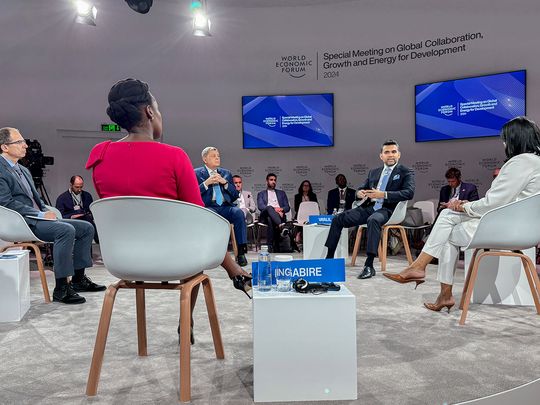
During the World Economic Forum’s Special Meeting on Global Collaboration, Growth, and Energy for Development in Riyadh, a panel of leaders in healthcare and technology convened to discuss how technologies like AI hold the promise of bridging gaps in access to care. The session, titled ‘Realizing the Promise of Digital Healthcare’, highlighted the importance of adopting a unified approach to harness technology and the need for meaningful collaborations to enhance healthcare outcomes worldwide.
Dr. Shamsheer Vayalil, Founder and Chairman of Burjeel Holdings, advocated for the integration of AI and other digital technologies to manage healthcare across the MENA regions. “We are living in a tech-enabled age of healthcare. For us, it is about using technology to reduce the gaps between the haves and have-nots in healthcare. There needs to be a global healthcare strategy where we need to overcome the challenges that we are facing with manpower, supply chains, etc. Digital health technologies will be the most disruptive and innovative and will move healthcare from the Break-Fix model of medicine to the Predict-and-Prevent model.”
Paula Ingabire, Minister of Information Communication Technology and Innovation of Rwanda, described how Rwanda is positioning itself as a testing ground for healthcare innovations that could be scaled globally. “What we want to do is be able to test and try all these innovations that can help to close on the gaps that we have as a developing country, as a landlocked country. Once we’re able to test and prove this, then you’re able to even scale from Rwanda because these are challenges that are pretty much shared across different pockets of the world.”
Stéphane Bancel, CEO of Moderna Therapeutics, emphasised the importance of collaboration across sectors to accelerate the development of patient-centric solutions. “I think we have learnt that we have to work together. Nobody has all the expertise to really bring the solutions to the patients. I think what we have to do more as public-private partnerships and across industry as well is to always obsess about the patient.”
Mazen S. Darwazeh, Executive Vice-Chairman and President of MENA at Hikma Pharmaceuticals, pointed out the AI implementation in the Arab world and its promising potential. “The practical use of AI in healthcare is still at the beginning, but what we have seen is giving us the huge promise that we can use it in a very positive manner. If we utilize AI in a positive manner, we can save lots of lives.”
Sylvana Quader Sinha Founder, Chair and Chief Executive Officer, Praava Health, who moderated the panel also highlighted the need for a robust approach to employing digital health technologies.
“Our goal is to move care back into the community. For the next 5 years, we will focus more on day surgical, and ambulatory surgeries. We are using more robotics, data, remote monitoring, and home care for a more proactive approach to health management that minimizes complications, keeps patients healthier and supports effective management of health conditions,” added Dr Shamsheer.
The experts collectively called for breaking down silos and fostering cross-industry collaborations to scale solutions that can address the complex challenges of healthcare provision while reducing costs.






